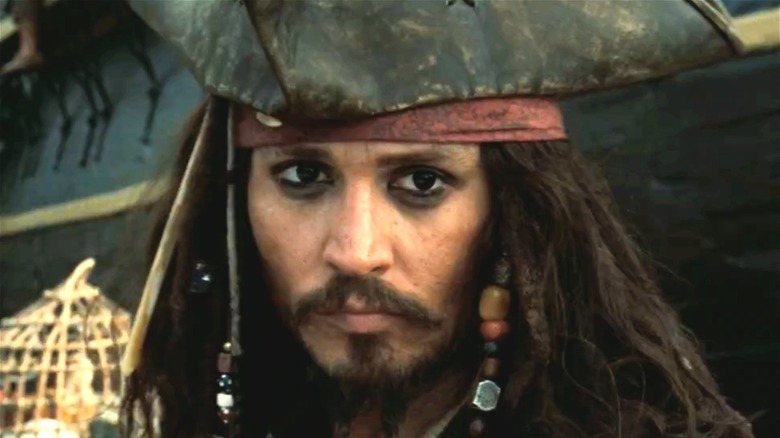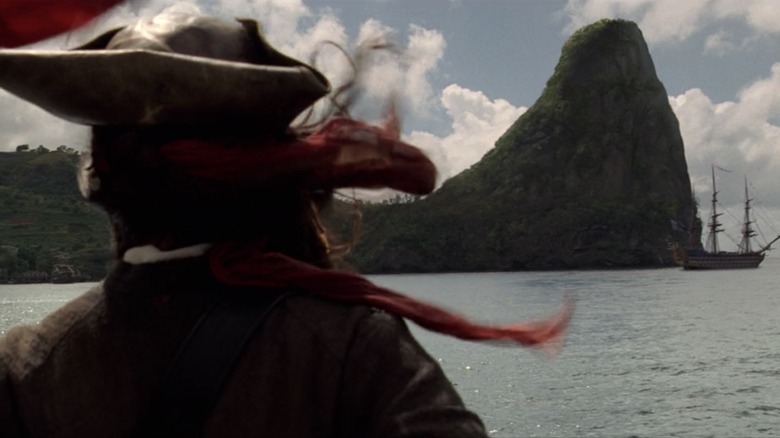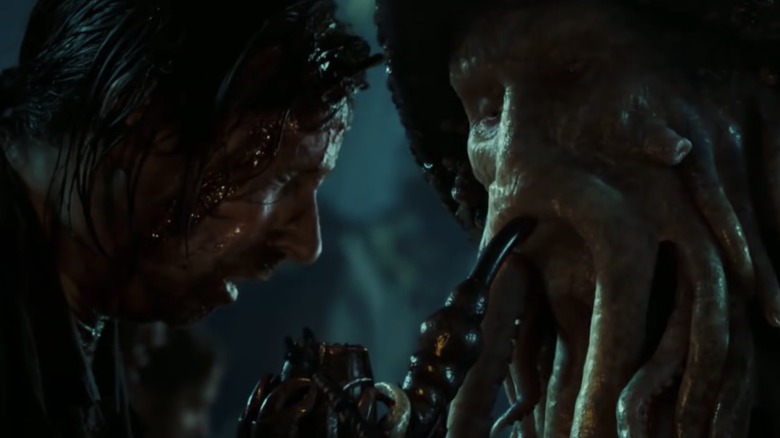The Deleted Pirates Of The Caribbean Scene That Would Have Changed Everything
Deleted scenes often get deleted for good reason. Sometimes, perhaps, they change the movie's pacing or tone. Maybe they offer nothing but unnecessary exposition, extending the movie's runtime for no reason. On many occasions, these scenes end up getting included as bonus material in DVD releases, so fans can see them after the fact without having them change the moviegoing experience. Usually, you can tell — or at least theorize — why the deleted scene got cut out of the movie, and agree that it didn't make sense to include it.
That's not necessarily the case with one particular scene from "Pirates of the Caribbean: At World's End," however. The third installment in the "Pirates of the Caribbean" franchise from 2007 actually revealed something about Captain Jack Sparrow's (Johnny Depp) character and backstory that hadn't been seen before in the franchise.
Viewers may recall that Sparrow's past life isn't really touched on much at all during the course of the movies. It turns out there's a four-minute scene that really gives him more depth — and explains why, in "The Curse of the Black Pearl," he's introduced in a dinghy that's taking on water, watching his abandoned ship from afar, and by the time he arrives at the dock, he's standing at the top of the mast and simply steps ashore as his dinghy disappears into the waves.
Here's what the deleted scene revealed.
The deleted scene features a conversation between Jack Sparrow and Cutler Beckett
The scene in question happens while Sparrow is a prisoner aboard the East India Trading Company's flagship, and also features Lord Cutler Beckett (Tom Hollander). Jack is shoved into Beckett's office, and the villain reminds him that they had previously had a deal in which the pirate was to deliver cargo for him, but Jack "liberated" it instead. To which Jack replies casually, "People aren't cargo, mate" — as he upturns items looking for the heart of Davy Jones (Bill Nighy), which Beckett tells him is stowed safely aboard another ship.
Beckett also uses the conversation to remind Jack Sparrow of his debt to Davy Jones: At some point, Beckett sunk Jack's ship in revenge for liberating that cargo. Jack promised his soul to the ruthless ruler of the Seven Seas in exchange for raising Jack's ship and years of servitude. Jack tells Beckett the debt has been paid, but Beckett says, "And yet, here you are." Clearly, this deal with Davy Jones doesn't sit well with this evil seafarer. During the exchange, Jack tells Beckett, "You have spared me any possibility of ending up as anything other than what I am, and for that, I truly thank you."
Then Beckett gets to the nitty-gritty. He wants information about who the pirate lords are, where they're meeting as the Brethren Court, and the purpose of the Nine Pieces of Eight.
The scene may be deleted, but Jack Sparrow's origin story has been documented in a prequel novel
Jack can be a morally ambiguous character, considering he's a pirate who sacrificed 100 souls to save his own skin (one fan suggests says this was a direct response to the 100 souls that Beckett says he "liberated"). Meanwhile, Beckett is seen as representing the side of law and order.
Without this scene, fans have no idea why Beckett and Sparrow have this animosity toward each other, or why Jack made a deal with Davy Jones in the first place. Heck, fans don't even know how Jack Sparrow entered the criminal life as a pirate.
While the scene was deleted — thereby making it questionable whether or not it remains part of the franchise's canon — there is another source out there that follows this same narrative. A.C. Crispin's prequel book "Pirates of the Caribbean: The Price of Freedom" tells the story in detail (via Goodreads), and it focuses on a 25-year-old Jack Sparrow, who actually works for the East India Trading Company as a first mate. When his ship is attacked by pirates, killing his captain, he may be getting a promotion. Cutler Beckett can offer him that, but first he sends the future pirate on a treasure hunt to a magical island. Jack knows Beckett plans to enslave the people there, and decides to foil the official's plans.
Thus, the scene in the movie would have confirmed Sparrow's backstory, giving him a more upstanding character (although some might say this isn't necessary) — or at least some context to some of his less savory actions. At this point, of course, the possible reboot of the "Pirates of the Caribbean" movies could always change everything up, but that remains to be seen.


